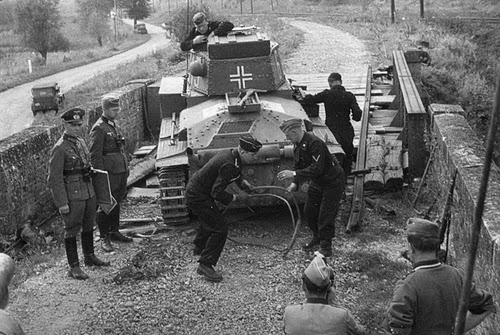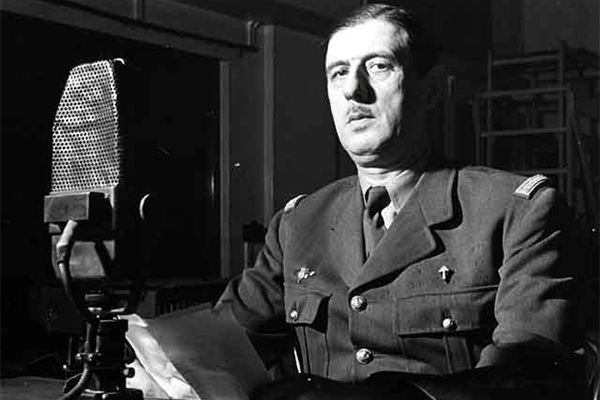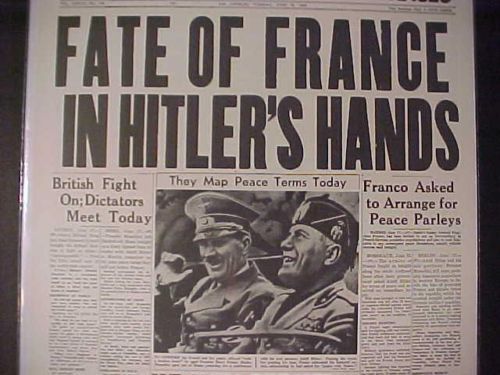Tuesday 18 June 1940
 |
| Winston Churchill dressed to the nines as usual on 18 June 1940. |
Elsewhere, the Wehrmacht faces declining French resistance. All cities over 20,000 inhabitants are declared open cities, like Paris. This is a popular decision that saves many lives.
The French set up a line along the Loire to defend the sector Tours/La Charité. The Germans establish bridgeheads between Orleans and Nevers. Le Mans, Briare, Le Creusot, Belfort, Dijon and Colmar all are now in German hands. The French cavalry school at Samur vows to fight together as a unit, instructors and cadets.
 |
| French Prime Minister Pétain has big decisions to make on 18 June 1940. |
Operation Ariel, the evacuation of British troops and some others from France, winds down, though some operations continue in the south. The Admiralty announces that nearly all British troops have been evacuated. At La Pallice, for instance, the Royal Navy completes its evacuation of 10,000 British soldiers, leaving behind their vehicles. There are continued evacuations, but they primarily are of allies. At St. Nazaire, the evacuation also concludes, with the British leaving behind their equipment.
The RAF completes its evacuation from France to England with the departure of Nos. 1 and 73 Squadrons, which had been the first to arrive in 1939. The RAF lost 1,029 aircraft with 1,500 casualties while on the Continent.
 |
| General Erwin Rommel (left) and a Panzer 38(t) tank on a bridge in France, 1940. |
U-32 (Oberleutnant zur See Hans Jenisch) torpedoes and sinks 1,522-ton Norwegian freighter Altair south of Ireland. All 18 onboard survive.
U-32 then sinks 108-ton Spanish fishing trawler Nuevo Ons with gunfire. There are seven survivors, and six perish.
U-32 also sinks 108-ton Spanish fishing trawler Sálvora with gunfire. All 12 onboard survive.
28,100-ton French troopship Champlain hits a mine and is seriously damaged. It is dead in the water and an easy target if the Germans spot it.
Kriegsmarine minesweeper M-5 hits a mine and sinks off Norway.
Brand new French battleship Richelieu (with destroyers Fougueux and Frondeur) departs from Brest for Dakar. Incomplete French battleship Jean Bart is towed out of St. Nazaire. It has its engines and is fueled at sea, then sets off at half-speed for Casablanca while evading Luftwaffe air attacks. The ships are taken out at risk to themselves out of fear of the approaching 5th Panzer Division.
The French scuttle nine French submarines, a destroyer, and a sloop at Brest and Cherbourg. They are immobile for various repair reasons.
Convoy OA 170 departs from Southend, Convoy OB 170 departs from Liverpool.
British corvette HMS Camellia (K 31, Lt. Commander Eric M. Mackay) is commissioned.
European Air Operations: The Luftwaffe sends a massive raid of 76 bombers against eastern England (Cambridge, Southend, the Thames estuary region) during the night. There are 11-12 dead and 30 injured. This is the first of a series of such nightly raids and could be counted as the unofficial start of the Battle of Britain. Meanwhile, the history books state that the Battle of Britain does not begin for another couple of months. The Luftwaffe incurs light losses during this period.
The RAF conducts reconnaissance over northern France, Belgium and Holland. The RAF also sends 69 bombers to drop 250 bombs on Bremen and Hamburg.
Battle of the Pacific: 13,415-ton liner RMS Niagara (Captain William Martin) hits a mine and sinks off Auckland, New Zealand. Niagara is carrying £ 2.25 Million of gold from the Bank of England bound for the United States in payment for munitions. The wreck settles at 121 meters of water. Immediately, thoughts turn to salvage of the gold, but the ship is at the outer limits of salvage operations.
German auxiliary cruiser Orion captures the Norwegian vessel Tropic Sea near the Society Islands.
German/Italian Relations: Hitler and Mussolini meet in Munich to discuss the French request for an Armistice. They are in no hurry to end the campaign. They ultimately send a request for the names of French plenipotentiaries to the French government currently at Bordeaux. Hitler is not impressed by the Italian contribution and gives Italy only a small zone of occupation in southern France. Mussolini is chagrined, but he has other plans of his own which he does not disclose to his partner.
US/French Relations: The US is concerned, as are the British, about the French fleet. U.S. Secretary of State Hull directs Deputy U.S. Ambassador to France Anthony J. Drexel Biddle, Jr., to tell the French that a German takeover of the fleet would the French to "permanently lose the friendship and goodwill of the Government of the United States."
The French are not impressed by the rough diplomatic veiled threat and say that they are "deeply pained" by the attempted coercion. Nonetheless, the French Minister for Foreign Affairs Baudouin promises that the French fleet "would never be surrendered to Germany." Admiral Darlan seconds this assurance.
Bulgarian/Romanian Relations: Bulgaria demands that Romania cede southern Dobruja.
Uruguay: The Uruguayan government has arrested 8 German leaders, according to US Ambassador to Uruguay Edwin C. Wilson.
Canada: Mackenzie King introduces to the Canadian House of Commons the National Resources Mobilization Act. This implements national registration and conscription for home defense.
Baltic States: The Soviet occupation is complete. The Soviet government promises to give the Germans $7.5 million in gold for the courtesy of honoring the Ribbentrop/Molotov Agreement.
Latvia: The Soviets form a new government from a list of approved candidates.
Sweden: The government permits unrestricted German transit on the vital railway to Narvik, including German troops and military supplies.
Italian Somaliland: The English King's African Rifles raid the Italian port of El Uach.
French Somaliland: Italian artillery bombards French positions.
Italy: The government secures ancient monuments and statues against possible air attack.
China: At the Battle of Tsaoyang-Ichang, the Japanese 11th Army consolidates its hold on Ichang and Tangyang. Chinese 5th War Area goes over to the defensive.
Polish Government: General Sikorski arrives in London on an RAF plane. He meets with Churchill, and they agree on the evacuation of Polish soldiers from their location at La Pallice.
British Government: Winston Churchill at 15:45 addresses the House of Commons with one of his famous speeches. He states that this could be the country's "Finest Hour":
What General Weygand has called the Battle of France is over ... the Battle of Britain is about to begin. Upon this battle depends the survival of Christian civilisation. Upon it depends our own British life, and the long continuity of our institutions and our Empire. The whole fury and might of the enemy must very soon be turned on us. Hitler knows that he will have to break us in this island or lose the war. If we can stand up to him, all Europe may be freed and the life of the world may move forward into broad, sunlit uplands.French Government: The cabinet continues to debate whether to evacuate to North Africa. New Prime Minister Pétain refuses to go, but President Lebrun and the two presidents of the Chambers of Parliament, Édouard Herriot and Jeanneney, want to go. The weight of opinion is to stay in France.
But if we fail, then the whole world, including the United States, including all that we have known and cared for, will sink into the abyss of a new dark age made more sinister, and perhaps more protracted, by the lights of perverted science. Let us therefore brace ourselves to our duties, and so bear ourselves, that if the British Empire and its Commonwealth last for a thousand years, men will still say, This was their finest hour.
French cruisers El Djezair, El Kantara, El Mansour, Ville d'Oran and Ville d'Alger evacuate 1,200 tons of French gold from Brest to Casablanca. In addition, the French use the cruiser Victor-Schoelcher to take 198 tons of Belgian gold from Lorient to the port of Dakar in French West Africa.
War Crimes: There are strong rumors that the advancing German troops have been murdering any black African French troops that they take prisoner. There is a German propaganda campaign that these French troops themselves are committing atrocities.
 |
| General De Gaulle giving his speech on 18 June 1940. |
The destiny of the world is here. I, General of Gaulle, currently in London, invite the officers and the French soldiers who are located in British territory or who would come there, with their weapons or without their weapons, I invite the engineers and the special workers of armament industries who are located in British territory or who would come there, to put themselves in contact with me.This speech initiates the image of de Gaulle, heretofore virtually unknown outside of military circles, as the leader of "Free France." It is fair to comment that de Gaulle likes to use the word "I" a lot as he develops a cult of personality.
De Gaulle has no official authority to make any claim to be a French spokesman and is no longer even in the government (though for the time being he remains a General). De Gaulle's sole source of power is that he has British backing due to his willingness to continue the fight. De Gaulle also has a large cache of French gold given to him by former Prime Minister Reynaud which will tide him over, though it is insufficient to form an army or anything like that. He certainly is an inspirational figure for many French citizens, though the legitimate French government does not think so and feels he is being counter-productive. De Gaulle returns the favor and pointedly refuses to recognize any French government under German domination, which creates a chasm between him and the "legitimate" Petain government. He no longer has any official reason to be in London and is "flying solo," at great risk to himself, creating an entire movement out of whole cloth. The course de Gaulle is taking practically defines the term "leader."
There is a tortuous story behind de Gaulle's speech. He was the one, along with Churchill, who came up with the "union" idea of France and the UK joining as one country. He flew back to France to argue for it and thought that Petain would agree with him, and was stunned when instead Petain surrendered. Returning immediately to England, de Gaulle asked to give this speech on 17 June, but the BBC required him to wait until 18 June - the anniversary of the French defeat at Waterloo.
General Legentilhomme, the French commander in Somaliland, quickly announces his support for de Gaulle, but few others do. It is easy to maintain that martial spirit when you are far from the panzers, not so much when the front that protects you is collapsing.
June 1940
June 1, 1940: Devastation at Dunkirk
June 2, 1940: Hitler Visits France
June 3, 1940: Operation Paula
June 4, 1940: We Shall Fight
June 5, 1940: Fall Rot
June 6, 1940: Weygand Line Crumbling
June 7, 1940: British Evacuating Narvik
June 8, 1940: Operation Juno
June 9, 1940: Norway Capitulates
June 10, 1940: Mussolini Throws Down
June 11, 1940: Paris an Open City
June 12, 1940: Rommel at St. Valery
June 13, 1940: France Goes Alone
June 14, 1940: Paris Falls
June 15, 1940: Soviets Scoop Up Lithuania
June 16, 1940: Enter Pétain
June 17, 1940: The Lancastria Sinks
June 18, 1940: A Day of Leaders
June 19, 1940: U-boats Run Wild
June 20, 1940: Pétain Wilts
June 21, 1940: Hitler's Happiest Day
June 22, 1940: France Is Done
June 23, 1940: Hitler in Paris
June 24, 1940: Six Million Jews
June 25, 1940: German Celebrations
June 26, 1940: USSR Being Belligerent
June 27, 1940: Malta in Peril
June 28, 1940: Channel Islands Bombed
June 29, 1940: Gandhi Insists on Independence
June 30, 1940: Channel Islands Occupied
2020


No comments:
Post a Comment